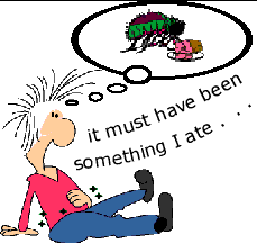Biohazard Cleanup Company Discusses Listeria

Flashback for Food Safety
In April, Aftermath featured a blog on Listeria and how trauma cleaning companies can help contain the spread of this bacteria. At the time, several ice cream makers were battling the bacteria in their factory kitchens, and while these companies have successfully returned their products to our shelves, Listeria is still making the news. In just the last week, Listeria was found in imported smoked fish and in mung bean sprouts packaged in Virginia.
So what is Listeria again? We’ve updated some of our information here, and look at some ways you can prevent it from ruining your summer. Basic precautions are not difficult, so stay healthy and happy through the back to school season!
What Is It?
People typically become infected with listeriosis after eating food contaminated with a bacterium called Listeria monocytogenes. This bacteria is more common than many believe. Soil and water can contain it, and animals like pigs and chickens may carry it without showing any outward sign of the illness. Uncooked meat, vegetables, and dairy can all be contaminated with Listeria, and the bacteria can be tracked into factories by workers, on raw materials such as produce, or in shipping containers or vehicles. The CDC estimates that an average of over 1600 people in the US contract the illness each year, and nearly 20% of those infected will die from their illness, though deadlier/more virulent outbreaks have been reported.
The FDA reports that it can sometimes be difficult to trace back an outbreak as symptoms may not appear until weeks after the initial infection. Typical symptoms are flu-like, and may include: muscle aches, gastrointestinal symptoms, and a fever or chills. A medical professional will be able to distinguish between Listeria, the flu, and other foodborne viruses; if you are ill, see your doctor as soon as possible. They may or may not advise an emergency room visit.
Best Ways to Prevent Listeria
More than simply knowing what Listeria is, prevention goes a long way to keeping your family healthy and safe from foodborne bacteria. Some important tips include:
Staphylococcus, E.Coli, and Samonella are other foodborne bacteria which appear in the media with similar and alarming regularity. Protection measures against these bacteria generally follow the same guidelines as Listeria, but be sure to check with a medical professional for specifics. And as with all cases of illness, if you or someone you know is showing symptoms of infection and may have come into contact with any bacteria, contact your doctor for instructions.
***
Aftermath Services provides comprehensive communicable disease and bacteria cleanup for a wide range of situations. Contact us 24/7 for a full list of our available cleaning services. Your safety is our top priority. Call 877-872-4339 and learn whether a full scale cleanup is right for your home or business.
 877-872-4339
877-872-4339  Contact Us
Contact Us 






